Related Research Articles

Lionel Barrymore was an American actor of stage, screen and radio as well as a film director. He won an Academy Award for Best Actor for his performance in A Free Soul (1931), and is known to modern audiences for the role of villainous Mr. Potter in Frank Capra's 1946 film It's a Wonderful Life.

John Barrymore was an American actor on stage, screen, and radio. A member of the Drew and Barrymore theatrical families, he initially tried to avoid the stage, and briefly attempted a career as an artist, but appeared on stage together with his father Maurice in 1900, and then his sister Ethel the following year. He began his career in 1903 and first gained attention as a stage actor in light comedy, then high drama, culminating in productions of Justice (1916), Richard III (1920), and Hamlet (1922); his portrayal of Hamlet led to him being called the "greatest living American tragedian".
"Stormy Weather" is a 1933 torch song written by Harold Arlen and Ted Koehler. Ethel Waters first sang it at The Cotton Club night club in Harlem in 1933 and recorded it with the Dorsey Brothers' Orchestra under Brunswick Records that year, and in the same year it was sung in London by Elisabeth Welch and recorded by Frances Langford. Also in 1933, for the first time the entire floor revue from Harlem's Cotton Club went on tour, playing theatres in principal cities. The revue was originally called The Cotton Club Parade of 1933 but for the road tour it was changed to Stormy Weather Revue; it contained the song "Stormy Weather", which was sung by Adelaide Hall.
The Barrymore family, and the related Drew family, form a British-American acting dynasty which traces its acting roots to the mid-19th century London stage. After migrating to the United States, members of the family appeared in motion pictures.

The Paradine Case is a 1947 courtroom drama with elements of film noir set in England, directed by Alfred Hitchcock and produced by David O. Selznick. Selznick and an uncredited Ben Hecht wrote the screenplay from an adaptation by Alma Reville and James Bridie of the 1933 novel by Robert Smythe Hichens. The film stars Gregory Peck, Ann Todd, Alida Valli, Charles Laughton, Charles Coburn, Ethel Barrymore, and Louis Jourdan. It tells of an English barrister who falls in love with a woman who is accused of murder, and how it affects his relationship with his wife.

Ethel Barrymore was an American actress and a member of the Barrymore family of actors. Barrymore was a stage, screen and radio actress whose career spanned six decades, and was regarded as "The First Lady of the American Theatre". She received four nominations for the Academy Award for Best Supporting Actress, winning for None but the Lonely Heart (1944).
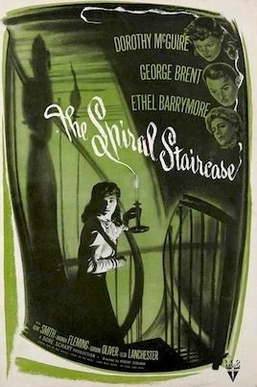
The Spiral Staircase is a 1946 American psychological horror film directed by Robert Siodmak and starring Dorothy McGuire, George Brent, and Ethel Barrymore. Set over the course of one evening, the film follows a mute young woman in an early-20th century Vermont town who is stalked and terrorized in a rural mansion by a serial killer targeting women with disabilities. Gordon Oliver, Rhonda Fleming, and Elsa Lanchester appear in supporting roles. It was adapted for the screen by Mel Dinelli from the novel Some Must Watch (1933) by Ethel Lina White.
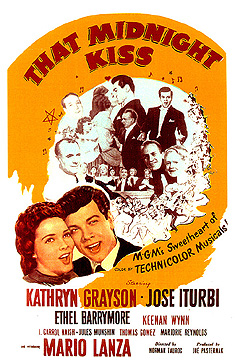
That Midnight Kiss is a 1949 Technicolor American musical romance film also starring Mario Lanza and Kathryn Grayson. Among the supporting cast were Ethel Barrymore, conductor/pianist Jose Iturbi, Keenan Wynn, J. Carrol Naish, and Jules Munshin. The commercially popular film was directed by Norman Taurog, who the following year would again direct Lanza and Grayson in the even more successful The Toast of New Orleans.

Moonrise is a 1948 American film noir crime film directed by Frank Borzage starring Dane Clark, Gail Russell and Ethel Barrymore. It is based on the 1946 novel of the same name by Theodore Strauss. The plot concerns the son of a man who was hanged for murder, leading to his own bullying by others and subsequent trials when he commits a crime in self-defense.
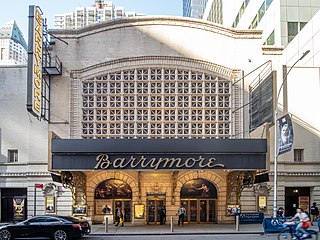
The Ethel Barrymore Theatre is a Broadway theater at 243 West 47th Street in the Theater District of Midtown Manhattan in New York City. Opened in 1928, it was designed by Herbert J. Krapp in the Elizabethan, Mediterranean, and Adam styles for the Shubert family. The theater, named in honor of actress Ethel Barrymore, has 1,058 seats and is operated by the Shubert Organization. Both the facade and the auditorium interior are New York City landmarks.
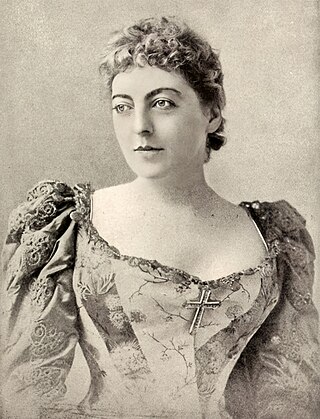
Georgiana Emma Drew, a.k.a.Georgie Drew Barrymore, was an American stage actress and comedian and a member of the Barrymore acting family.
All at Sea may refer to:

Rasputin and the Empress is a 1932 American pre-Code film directed by Richard Boleslawski and written by Charles MacArthur. Produced by Metro-Goldwyn-Mayer (MGM), the film is set in Imperial Russia and stars the Barrymore siblings. It is the only film in which all three siblings appear together.

Night Song is a 1948 American drama film directed by John Cromwell and starring Dana Andrews, Merle Oberon and Ethel Barrymore.

Main Street to Broadway is a 1953 American romantic musical comedy-drama film by independent producer Lester Cowan, his final credit, in collaboration with The Council of the Living Theatre, which provided tie-up with a number of well-known Broadway names. The backstage story features Tom Morton as an aspiring playwright who hopes to stage a Broadway production, Mary Murphy, as a young lady from Indiana, and radio-TV humorist Herb Shriner in a rare acting role as a hardware store owner.
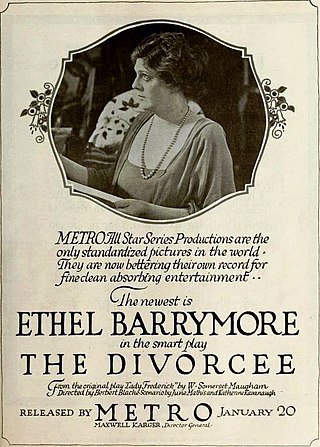
The Divorcee is a 1919 American society drama starring Ethel Barrymore in her last silent feature film. The film is based on a 1907 play, Lady Frederick by young Somerset Maugham, which had starred Barrymore on Broadway. The play was already quite dated when this film was made, but the actress was always comfortable with this kind of soap-operish melodramatic material. Herbert Blaché directed, and June Mathis wrote the scenario based on Maugham's play. The film was produced and distributed by the Metro Pictures company.
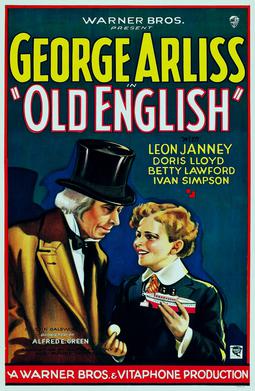
Old English is a 1930 American pre-Code drama film directed by Alfred E. Green and produced by Warner Bros. The film is based on the 1924 West End play of the same name by John Galsworthy. The film stars George Arliss, Leon Janney, Betty Lawford and Doris Lloyd. The film had its premiere August 21, 1930 at the Warner's Theatre in Hollywood.

"That's all there is, there isn't any more" was a phrase Ethel Barrymore used to rebuff curtain calls. The line entered the national consciousness of the United States in the 1920s and 1930s and has often been referenced and parodied.

Ethel Barrymore was an American actress of stage, screen and radio. She came from a family of actors; she was the middle child of Maurice Barrymore and Georgie Drew Barrymore, and had two brothers, Lionel and John. Reluctant to pursue her parents' career, the loss of financial support following the death of Louisa Lane Drew, caused Barrymore to give up her dream of becoming a concert pianist and instead earn a living on the stage. Barrymore's first Broadway role, alongside her uncle John Drew, Jr., was in The Imprudent Young Couple (1895). She soon found success, particularly after an invitation from William Gillette to appear on stage in his 1897 London production of Secret Service. Barrymore was soon popular with English society, and she had a number of romantic suitors, including Laurence Irving, the dramatist. His father, Henry Irving, cast her in The Bells (1897) and Peter the Great (1898).

Meet the Richardsons is a British comedy television series that premiered on 27 February 2020, on Dave. It stars husband and wife comedians Jon Richardson and Lucy Beaumont as fictionalised versions of themselves discussing their lives in a mockumentary format. Various comedians and celebrities make appearances, usually also as fictionalised versions of themselves.
References
- ↑ Hoffman, Carol Stein (2001). The Barrymores: Hollywood's First Family . Lexington, KY: University Press of Kentucky. p. 224. ISBN 978-0-8131-2213-7.